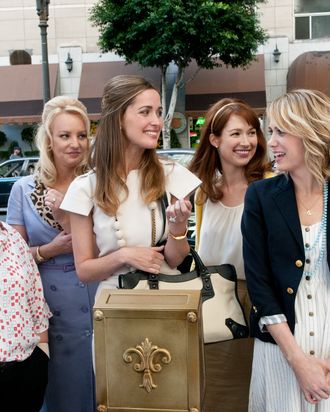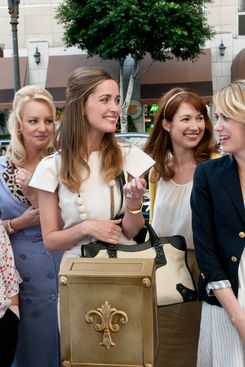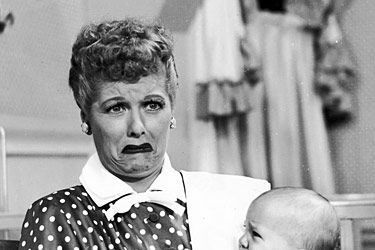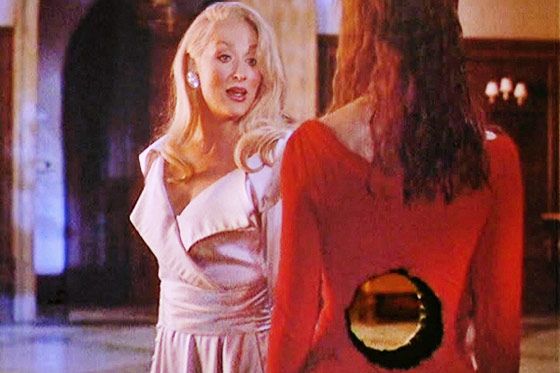Photo: Suzanne Hanover/Universal Studios. ALL RIGHTS RESERVED.
Some are claiming that with this week’s Bridesmaids, females will finally start playing on the same gross-out comedy field as men. We’ll see if those pronouncements turn out to be true once the film opens, but it is a fact that even as raunchy, boys-will-be-boys comedies have grown exponentially, many have wondered where the girls are. That’s a complicated question, of course (Christopher Hitchens and Alessandra Stanley once traded essays over at Vanity Fair about whether women were funny), but we thought it would be interesting to look at the evolution of the female gross-out comedy over the years, and note the giants and not-so-giants on whose shoulders Bridesmaids now hopes to stand. Searching through the past yielded some fascinating results — which in their own way go toward explaining some of comedy’s historical gender imbalance.
Yes, calling I Love Lucy a gross-out comedy (or raunchy in any way) is ridiculous, until you consider the fact that Lucille Ball’s gift for physical and even bodily humor contributed in many ways to her enormous appeal. Remember, this is a woman who turned her own pregnancy into a season-long plot point at a time when you couldn’t actually say “pregnant” on TV. And although this is a list of movies, we have to tip our hat to the TV comedienne who paved the way for everybody else.
Where does one even start with this? Before he was a cuddly pop culture icon and Broadway impresario, John Waters was the no-budget cinematic sludge-poet of the dirty American female. Any of his films could have made this list, but this portrait of white trash families engaged in a contest to become the filthiest people alive may well be his masterpiece. True, the film’s star Divine was actually a man named Harris Glenn Millstead, so maybe we can’t count the scene in which she eats dog poop, but c’mon, this is a movie in which Mink Stole runs a black market kidnapping-and-impregnation ring, so there’s plenty of raunch to go around here — including a scene that made it onto
ourearlier slideshow of the ten most brutalized wangs in movie history, in which two pregnant women brutally emasculate a rapist. Go get ‘em, girls!
This is a fascinating test case. The only movie Joan Rivers actually directed (directed!) isn’t, technically speaking, a female comedy at all, since it’s about Billy Crystal becoming the world’s first pregnant man. But the film’s gags have nothing to do with the comic gender role reversal: The film could star a woman and most of the jokes (not good jokes, mind you) would be the same. The humor is all about how pregnancy can be kind of gruesome for anybody who goes through it. This came out the same year that Animal House kicked off the man-child movie trend, but Rivers couldn’t make a mainstream gross-out movie about feminine problems that actually starred a woman.
The gross-out movie tends to have its own sub-genres. For example, the Apatowian school tends to focus on bodily function gross-out. But there’s also gore gross-out — as with this overproduced Robert Zemeckis SFX extravaganza in which youth-obsessed rivals Meryl Streep and Goldie Hawn discover a potion that makes them immortal. The film quickly detours into a mounting orgy of CG tastelessness, the whole thing basically becoming an excuse to show Streep and Hawn not-killing each other in increasingly gruesome ways. And while the sight of the latter with a giant gaping hole in her torso is something to behold, there’s something curiously antiseptic about the whole thing: The girls let the computer effects do their dirty work for them, without ever really letting things hang out.
The Farrelly Brothers’ masterpiece is still basically about the travails of lovelorn male losers, but it was also something of a watershed in the development of the raunchy female comedy: Cameron Diaz’s Mary is more than just your average set-dressing romantic interest, gamely getting in on the foul-mouthed fun. And, although Mary mostly stays away from the body humor herself (besides being the punchline of the now-infamous sperm-on-the-ear gag), we’re convinced she’s the reason why the mainstream female gross-out genre started in earnest following the success of this film.
It came and went in the blink of an eye, but this bizarre Farrelly-produced comedy starring Heather Graham and Chris Klein (hey, remember those two?) was actually kind of daring in the way it gave the female top billing. That’s not to say it was any good. Klein plays a kind-hearted soul with a fondness for Suzanne Somers–fixated auto-eroticism who falls for beautiful hair-dresser Graham after she cuts off his ear. The two lovers then discover that they might actually be brother and sister. Incest, amputees, stroke victims, dead animals … really, what’s not to like? Look fast for a brief supporting turn by Sarah Silverman, who gets to go down on the villain.
Regarded by many (we’d argue, inaccurately) as the first full-fledged female gross-out comedy, this Cameron Diaz star vehicle is a perfect example of why this is such a tough genre to pull off. You would think that such a film would be somewhat empowering, but you would be wrong, since much of the film involves Cameron desperately stalking soon-to-wed Thomas Jane after talking to him briefly at a party. We’re not even going to discuss the bizarre soft-core humiliations visited upon Selma Blair’s lovesick character; it’s too depressing. Still, there’s plenty of bathroom humor and rancid food jokes to be had here.
Jenny McCarthy, perhaps realizing that Cameron Diaz hadn’t exactly fulfilled her true potential, tried to seize the moment with this extreme comedy, which actually might have been thought up by John Waters: The gags here include fish in bodily orifices, buckets of vomit, and a supermarket menstruation scene that sort of has to
be seen to be believed, if it must be seen at all. Perhaps notable mainly for prompting the even-keeled-to-a-fault Stephen Holden of the New York Times to uncharacteristically denounce the film as “cling[ing] to the gutter like a rat in garbage.”
This 2005 film version of the cult TV show featuring Amy Sedaris as an aging ex-con who goes back to high school was supposed to be the comedienne’s big breakout. Instead, it proved to be a perfect example of the weird dissonance that can occur when something that worked so well on TV gets translated to a feature film. Still, we have to give Sedaris props – her foulmouthed, sociopathic character Jerri Blank is both a hilarious and a disturbing creation.












![Jenny McCarthy, perhaps realizing that Cameron Diaz hadn’t exactly fulfilled her true potential, tried to seize the moment with this extreme comedy, which actually might have been thought up by John Waters: The gags here include fish in bodily orifices, buckets of vomit, and a supermarket menstruation scene that sort of has to be seen to be believed, if it must be seen at all. Perhaps notable mainly for prompting the even-keeled-to-a-fault Stephen Holden of the New York Times to uncharacteristically denounce the film as “cling[ing] to the gutter like a rat in garbage.”](https://pyxis.nymag.com/v1/imgs/11c/46f/427776a10e7c4c237a64e0f98b5cff4998-20110513-grossfunnyladies-7-dirtylove.rhorizontal.w700.jpg)
